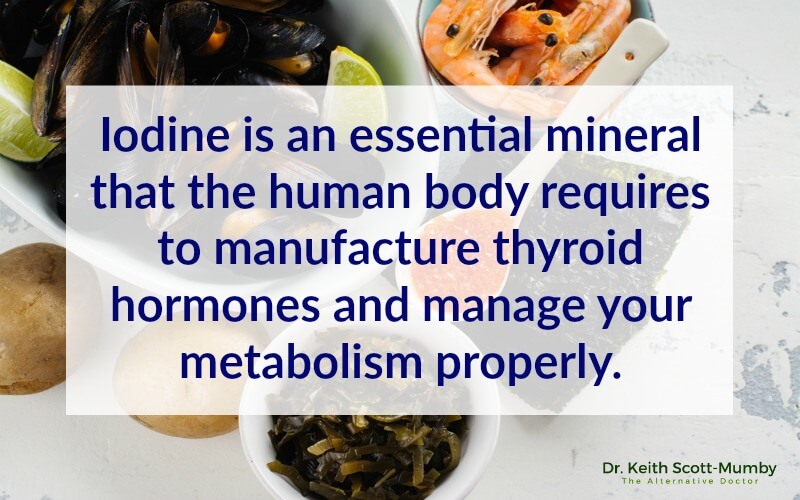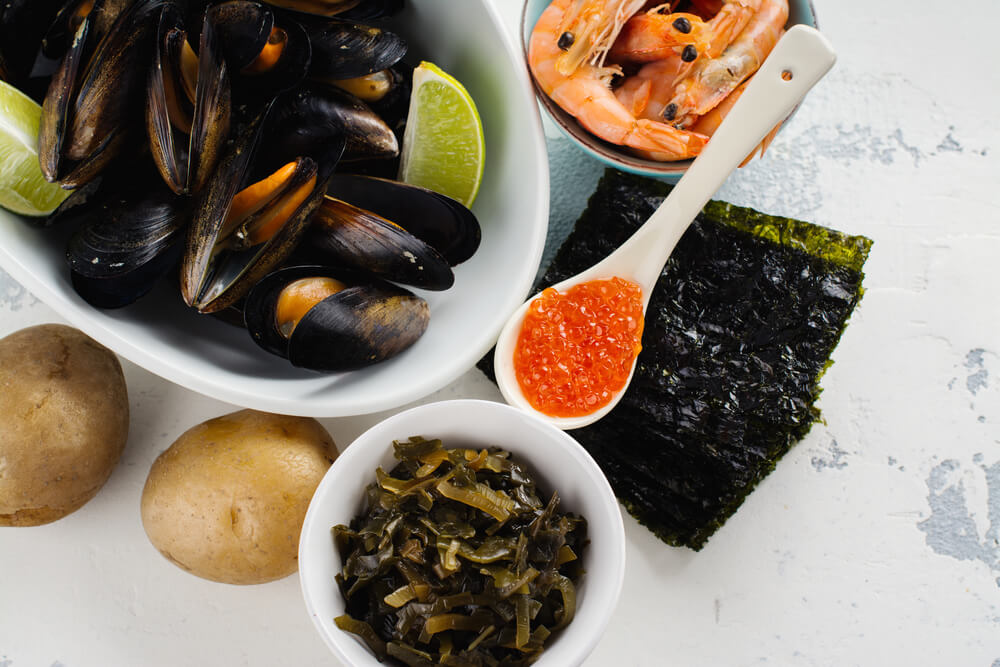When there’s an iodine deficiency in the diet of young people, it results in hypothyroidism.
Iodine is an essential mineral that the human body requires to manufacture thyroid hormones, assist with growth and development, and to manage your metabolism properly.
Many common health conditions can be traced to not getting enough iodine in the diet, including blood pressure, cystic fibrosis of the breasts, bad cholesterol, ovarian cysts, arthritis, and under-performing thyroid. When your thyroid doesn’t work properly, it leads to sluggishness and weight gain.
Symptoms of Iodine Deficiency
- Increase in size of thyroid gland (goiter)
- Fatigue (no matter how much rest you get)
- Unexplained weight gain
- General weakness
- High cholesterol
- Depression or other mood disorders
- Rapid heart beat
- Changes in appetite
Iodine deficiency is rare in the Western hemisphere because salt is iodized, and the Standard American Diet is filled with it. However, it’s still important to incorporate other healthy sources of iodine with less salt.
You can take multivitamins with potassium to supplement any iodine you might be lacking in your diet day-to-day.
Everyone needs iodine. At every age, our bodies must get this essential mineral. These are the tolerable upper intake levels of iodine for each age group:
- 1-3 years: 200 mcg
- 4-8 years: 300 mcg
- 9-13 years: 600 mcg
- 14-18 years: 900 mcg
- 19 years and older: 1,100 mcg
- Pregnant women 14-18 years: 900 mcg
- Pregnant women 19 years and older: 1,100 mcg
- Lactating women 14-18 years: 900 mcg
- Lactating women 19 years and older: 1,100 mcg
You can choose to take supplements but they’re not always well-tolerated. Additionally, you don’t need to overdue this particular mineral. As usual, your best option to get the iodine you need is whole, natural foods. Avoiding iodine deficiency with food is safe and effective!

Selected Food Sources of Iodine
- Dried seaweed (the best source of iodine on the planet)
- Iodized salt (main source for most Americans)
- Sea vegetables (kelp, arame, wakame)
- Baked potato
- Milk
- Codfish
- Shrimp
- Himalaya sea salt (used in moderation)
- Turkey breast
- Prunes (dried plums)
- Navy beans
- Tuna
- Boiled eggs (also a complete protein source)
- Yogurt
- Bananas
- Strawberries
- Canned corn
- Lobster
- Cheddar cheese
- Cranberries (raw, canned, juice – beware of added sugars!)
- White bread (in moderation)
- Green beans
- Pineapple
- Rhubarb (also excellent as a natural laxative)
- Watercress
The amount of iodine in a food depends on how much iodine there is at the source of production and how much processing has been done. In other words, you’re going to get a bit less iodine in canned pineapple than fresh – but you’ll still get some!
5 Tips to Avoid Iodine Deficiency (and Improve Overall Health)
- Eat a variety of organic foods in your daily diet.
- Wash all fruits and vegetables thoroughly before consumption.
- Drink plenty of water (avoid sodas and other carbonated drinks).
- Avoid pre-prepared foods in bags, boxes, or cans.
- Try to detoxify your home, office, and personal care regimen of pollutants.
Integrate plenty (but not too many) iodine-rich foods in your diet to regulate your thyroid properly! Both too much and too little can lead to hypothyroid or hyperthyroid, it must be just right to continue to be beneficial for you.
Incorporating a variety of foods, plenty of water, and healthy lifestyle habits will help you avoid iodine deficiency and protect your body from a whole host of other problems.




